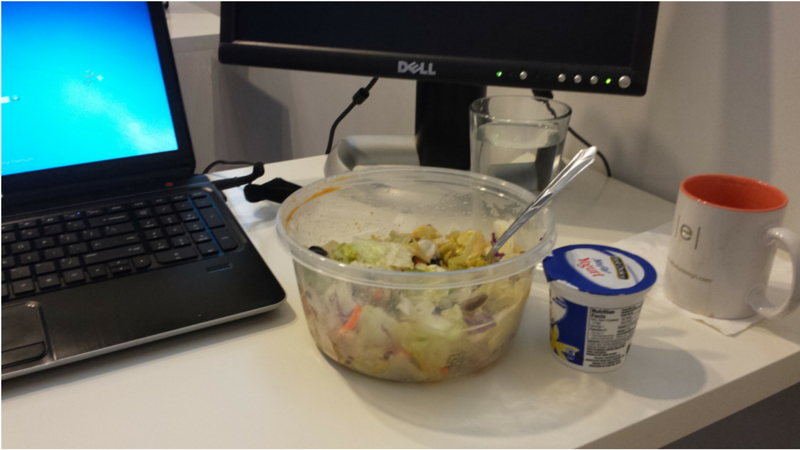“What’s for lunch today?”
The question came from the Executive Assistant at the organization I was doing some consulting for. She had happened upon me grabbing my lunch out of the communal fridge in the break room.
“Salad,” I replied.
“Didn’t you have salad last time you were here?”
“Yep,” I said as I closed the refrigerator. “I have salad every day.”
“Every day!!!????!!!” she retorted, with a mixture of surprise and curiosity. “Do you at least mix up different types of salad?”
“Nope. Same salad every day.”
“In fact, most days I eat exactly the same things at exactly the same times. Up until dinner; dinner is when I splurge.
“I don’t even hardly think about it…it’s just habit.”
“I could never do that,” she proclaimed, “it’s too boring.”
Steve Jobs was boring
Close your eyes and picture Steve Jobs. Can you see him?
There he is, with his close cropped hair, scraggly beard, and wire-rimmed glasses. He’s wearing a black turtleneck, jeans, and sneakers.
Think about it. With rare exception, he wore a black turtleneck, jeans, and sneakers.
A man who is celebrated as being one of the most creative, visionary minds the world has ever known wore the same outfit nearly every day (sources confirm he had multiple shirts and pairs of jeans).
How boring.
Decision fatigue
Turns out, Steve Jobs knew something that most people don’t. Mark Zuckerberg and Barack Obama know the secret too.
Its called decision fatigue, and it’s a big deal.
Think of it like this: when we all wake up in the morning, we are given a stack of poker chips. For each decision we make, we have to spend our chips.
Big decisions take lots of chips. Small decisions only take one chip. When you’ve exhausted your supply of chips, you are incapable of making any more decisions until tomorrow…after the magical chip fairy has visited you.
Oh yeah, the fairy only gives you a full allotment of chips if you get a good night’s rest.
Deciding what to wear in the morning might take one chip. If you’ve got a big meeting, or it’s that crazy “in-between” season like we have here in Nebraska (you know, the day begins cold but ends up hot by mid-afternoon)–thus requiring you to expend more thought–you might spend 4 chips.
Deciding where to cut the budget in response to a revenue shortfall might take 20 or 25 chips. Deciding how to spend a $50,000 windfall estate gift might take 50 chips. You get the idea.
What happens when you run out of chips
Think of a time when a member of your team presented you with options during an afternoon meeting. Even if it was a rather trivial decision–like going ahead with purchasing a new printer, when the purchase is in the budget and the money is in the bank–it might seem unreasonably difficult.
The numbers look fuzzy. The words your staff member is saying aren’t making sense. You’re having trouble focusing.
That’s what it feels like to have spent all your chips.
I’ve experienced this unsettling feeling. We all have.
At that moment you probably said something like, “I don’t know what’s wrong with me today!” Or, “I’m so tired…I just don’t want to think anymore today.”
That’s decision fatigue.
Spend your chips wisely
In a piece in Vanity Fair, Michael Lewis captures the President’s feelings on decision fatigue:
You need to remove from your life the day-to-day problems that absorb most people for meaningful parts of their day. “You’ll see I wear only gray or blue suits,” he said. “I’m trying to pare down decisions. I don’t want to make decisions about what I’m eating or wearing. Because I have too many other decisions to make.”
When you run a nonprofit, your greatest responsibility is to make decisions.
You don’t want to be short on chips if a significant decision needs to be made. That’s when you risk making a bad decision.
It’s these moments when you don’t want to regret staring into your closet for 10 minutes first thing in the morning or rubbing your tummy at lunch time trying to figure out what “sounds good.”
Where you economize is a personal decision
This brings us back to my salad lunch. For me food is fuel, nothing more. Lunch is merely the time to refill the tank for that afternoon’s journey.
I have a friend named John who takes his food pretty seriously. Eating is an experience for him. He knows about my system for saving mental energy on lunch, and does not it is heretical top him.
That’s okay; we’re all different. And that’s the point.
Where you economize your energy is a personal decision. If you try to adopt a system you hate, you’re not going to stick with it. It’s like walking up the down escalator.
Dumb little hacks
Say you do want to save time in the “getting dressed” portion of your day, but you want more variety in your wardrobe than Mr. Jobs.
I have a friend who is a connoisseur of men’s clothes, but hates deciding what to wear. He has developed a solution. He hangs his dress slacks in order on his closet rod.
In the morning he always grabs pants from the same side of the closet and then moves the next ones down, thus creating a rotation. He knows which shirts go with which slacks so that decision is eliminated. Same goes for shoes and belts.
It’s possible to develop a system that routine-izes your variety.
It doesn’t have to be iron clad
Sometimes I meet friends for lunch and I don’t eat salad.
Occasionally I change my mind, leave the salad in the fridge and go grab something on the spur of the moment.
The system doesn’t have to be rigid. You don’t have to cut off all human contact and move to a cabin in Montana.
But, it is a default option that, when you don’t have an exception, requires almost no thought to follow.
What do you think?
What benefits have you realized by opening up to a trusted confidant? I’d love to hear about it! Send me a message or hop over to the Nonprofit Wizards Facebook page!
Darren Macfee is the founder of the Nonprofit Wizards. His life purposes are to dispense homespun wisdom, grill a perfect meal for his family, and help nonprofit leaders create amazing results for and through their organizations. Follow him on Twitter @NPWizards or send him a note. Be sure to sign up for alerts so you never miss a post.

Good to Great: Why Some Companies Make the Leap…And Others Don’t by Jim Collins

Magnetic: The Art and Science of Engagement by Anne Bergeron and Beth Tuttle

Managing to Change the World: The Nonprofit Manager’s Guide to Getting Results by Alison Green and Jerry Hauser

The Art of Racing in the Rain by Garth Stein
Love Works: Seven Timeless Principles for Effective Leaders by Joel Manby

Strengths Based Leadership: Great Leaders, Teams, and Why People Follow by Tom Rath and Barry Conchie

Leading Out Loud: A Guide for Engaging Others in Creating the Future by Terry Pearce
 Leading with Soul by Lee Bolman
Leading with Soul by Lee Bolman
 The Effective Executive: The Definitive Guide to Getting the Right Things Done by Peter F. Drucker
The Effective Executive: The Definitive Guide to Getting the Right Things Done by Peter F. Drucker
Some titles above are affiliate links. If you’re not sure why you should care click here. You’ll also learn how you can help feed the children.
Newsletter



